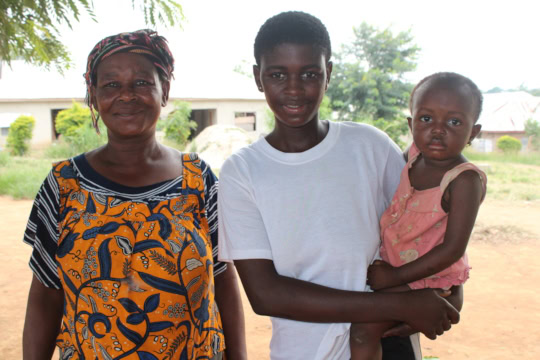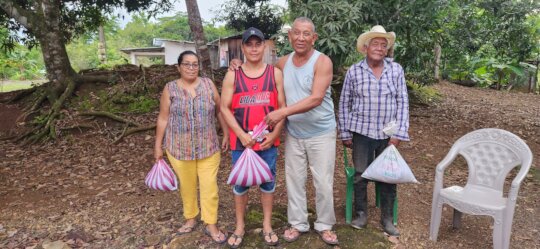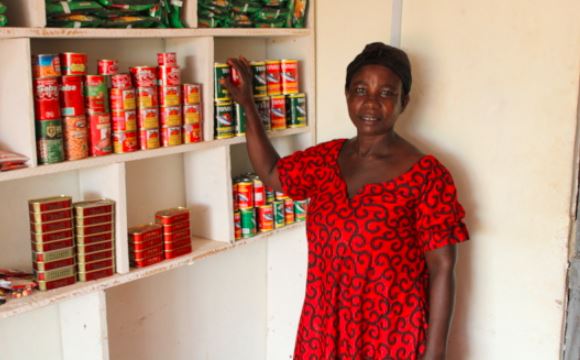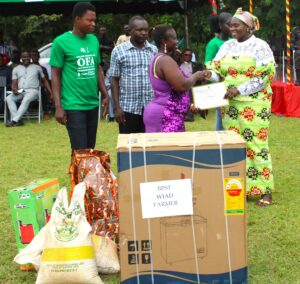Delayed Rains Leave Maize Fields Empty
In the rural communities of Nyame Bekyere, Timeabu, and Ul-Gozu in Ghana’s Ashanti Region, and Upper West Region, farmers like Joe, Agya Kusi, and Justine and many others had prepared for a good harvest this season (March-July, 2024).
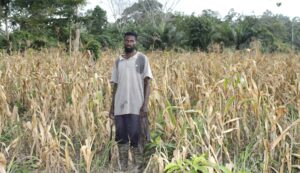
Farmer Joe
They planted maize, dreaming of feeding school children and their families, selling their produce, and covering the costs of school fees and medical bills. But the rain never came.
For months, the rains refused to fall. What began as a promising planting season soon turned into a nightmare. The farmers had invested their meager savings, cultivating about two acres of maize each, only to watch their crops wither under the unrelenting heat. Without rain, the maize wilted, the vibrant green stalks turning brittle and brown, falling apart in their hands.
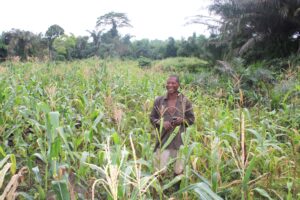
Farmer Kusi
Agya Kusi, a father of eleven, stands in the middle of his field, the silence of the dry soil beneath his feet weighing heavily on him. “We worked so hard to give these schoolchildren in Timeabu maize for their school feeding program, but nothing came from it—just a little maize, which would not even last them up to a term. All we wanted was rain, just a little. But the skies didn’t open.”
Job, a new client who had just joined Self-Help’s AED program and is being supported to cultivate 2.4 acres of maize farm, echoes Agya Kusi’s despair. “I was expecting about 5000 kg of maize after harvest. SHI taught me all the good agronomic practices, and it being my first time working with them, I gave it my all. I worked really hard, but there is nothing we can do now; just count our losses and move on.”
The loss is more than just money. These farmers are not just losing crops; they are losing hope in their land and in the weather they’ve trusted for years, limited water sources, especially in the upper west, and increased economic hardship. The delayed rains didn’t just ruin one planting season—it has sown uncertainty for the seasons to come.
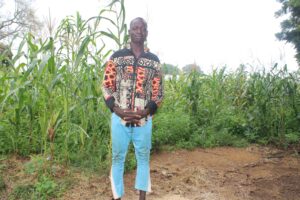
Farmer Justine
Self-Help International has been working with farmers like Agya Kusi, Job, Justine, among others, offering support through training and access to improved seeds. But even the best seeds can’t withstand a drought this severe. What the farmers need now is hope, and hope, they know, doesn’t always come from the skies.
Despite the loss, the farmers are determined. As the late rains begin to fall, too late for this season, but a glimmer of hope for next year as they are already planning for next year. With support from Self-Help, they’re learning about improved irrigation methods and the importance of saving during good years for the tougher ones.
“As a farmer, you don’t lose hope; all you need is good health, money, and strength.” And by the grace of God, we have good health, so we try again next year. Next year, we start early planting,” Justine says, with determined eyes.
The fields are empty now, but the farmers’ spirits are not. With support and hard work, they will plant again. And one day, when the rains come on time, they will harvest more maize than before.

